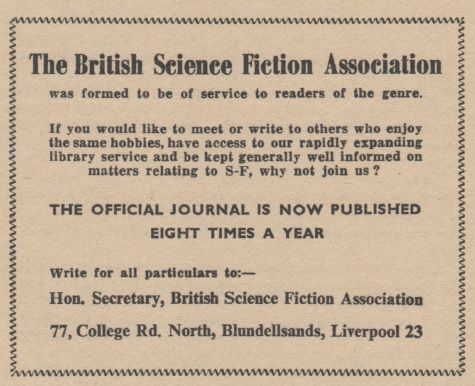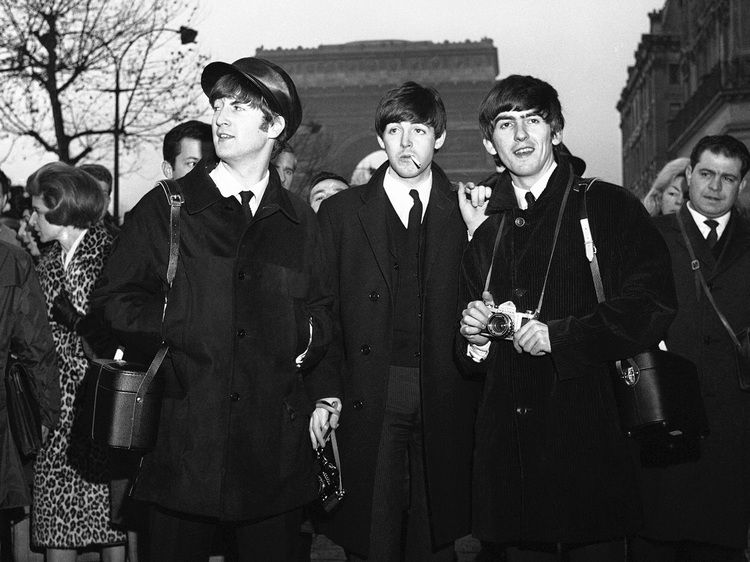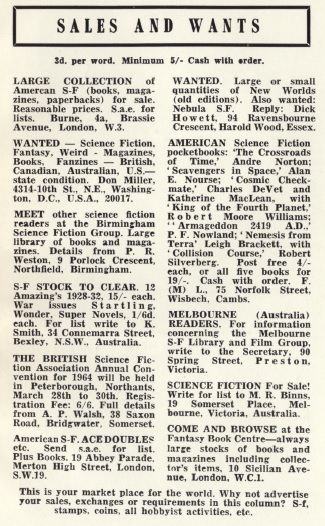
by Mark Yon
Scenes from England
Hello again!
Things have been busy since last time we spoke. I have been watching with interest (and some good-natured amusement!) the return of The Beatles to your shores. You really have taken the Liverpudlian mop-tops to your hearts, as they have taken over here. I did try and warn you last month about the effect that their enthusiasm and energetic pop can have on impressionable teenagers, and from what news coverage I have seen here many of you seem to have capitulated to their collective charms, as we had before Christmas.

Doctor Who is still continuing to enthrall and charm here. As fellow traveller Jessica has said already, the latest episode has been an odd one (to put it mildly!), but generally the family and I are still enjoying it a great deal. This is a rather different view to that given in this month’s New Worlds magazine, as you will see…
To the magazine, then.
The issue at hand

As we approach the end of the magazine next month, it does appear that there is a general feeling of closure evident. But, perhaps knowing that the end is near, the magazine has some terrific fiction amongst the usual fare.
We begin however with a typically controversial opinion. Whilst there is no guest editorial this month, in its place the issue has a summary of the state of sf in 1963 as editor Mr. Carnell sees it, entitled “A Dull Year".

Now that Mr. Carnell’s tenure as Editor is drawing to a close, it does seem that the gloves are off. His view comes across as rather grumpy. For example, describing Doctor Who as a programme “designed for teenagers and tottering oldsters" is a bit mean. Granted, it is not pushing the boundaries of sf too much, but the fact that we’re seeing any sf on British television I see as a strength. We are not as lucky as yourselves in the US – I still wish I could see The Twilight Zone here, but no sign yet.
Mr. Carnell is similarly disgruntled with sf fiction. There were over thirty hardback books published in Britain last year, but according to Mr. Carnell only three were of any merit. This may be a case of quantity over quality, although I found it interesting that a quick summary of the New Worlds Survey asked for last year (the first since 1958, don’t forget) may suggest another reason for Mr. Carnell’s umbrage – magazine sales are down but paperback sales are up.
After such a gloomy context, we begin the issue’s fiction with something a little more to Mr. Carnell’s taste, perhaps.
the terminal beach, by Mr. J. G. Ballard
The Terminal Beach is the story of Traven (typically no first names here!), who, for reasons that become clear over the course of the story, has travelled to the island of Eniwetok, a site of atomic bomb tests. As is typical of Ballard, the emphasis is more on mood and less on plot, with many of the Ballard motifs from other stories repeated: physical and mental decay, dystopian featureless buildings, isolation, and deteriorating technology. It is bleak, enigmatic and unsettling, and inevitably concerned with the human condition, which frankly isn’t looking great from this perspective. I’m not entirely sure what all of it is about, or even if it has an overall meaning, but its pervasive mood is chillingly depressing.
It is also a prime example of how far the British New Wave has changed science fiction in the last decade or so. We are light years away from spaceships and monsters here. 4 out of 5.
the traps of time , by Mr. John Baxter
And now to more traditional fare, a time travel story where a killer from the 39th century escapes justice to hide in the nuclear wastes of the 48th. The idea of how minor changes in time travel have consequences is nicely done, but overall the story adds little to the genre. The story concludes with that now almost-traditional downbeat note that seems to be a British convention. 3 out of 5.
unfinished business , by Mr. Clifford C. Reed
Even compared with the rest of the issue, this story is an oddity. Unfinished Business is a story of a married couple, one of whom disappears when flying off to see a pregnant friend. The result is that the remaining partner takes on deliberately dangerous jobs on other planets, not caring if he dies or not. After seventeen years he returns to Earth, to find that the girl who was born at the time of his partner’s apparent death seems strangely familiar. I suspect that it is meant to be creepy, but in the end comes across as just strange. 3 out of 5.
the unremembered , by Mr. Edward Mackin
Have you ever been subject to one of those rants by an old person that “things are not as good as they used to be"? Mr. Mackin’s story begins like that, with an elderly couple complaining about a depressing future world of synthetic foods and euthanasia clinics. It’s not too surprising then that with the closure of ‘the Clinics’, our protagonist is determined to discover another way out and finds some sort of Cosmic message at the end. It’s a mixture of dystopian social commentary and cosmic revelation that didn’t fit together well for me, to the point where this becomes another story with a title that seems to be sadly appropriate. 2 out of 5.
jetway 75 , by Mr. William Spencer
Mr. Spencer was last here as Bill Spencer in the October 1963 issue with Project 13013. This is a one-trick pony kind of tale, showing a future where pedestrians play chicken with the endless stream of cars on the titular means of conveyance. The point of the story, if there is any, seems to be that both walker and vehicle driver need this deadly interaction to create excitement in their otherwise humdrum life. Rather Ballardian, but without the style and skill, something emphasized by having The Terminal Beach in the same issue. 3 out of 5.
open prison , by Mr. James White
Last month this story left us with the situation where a group of inmates with an innate duty to escape from the prison planet were planning to heist an orbiting spaceship. Much of this middle part is about the preparation for “E-Day" and the practical and political challenges facing the escapees. Admittedly, the story moves along and there’s a building of tension as the escape approaches, but it is scarcely original and clearly the middle part of a story. And there’s still that patronizing tone that vacillates between “What are we going to let the useless girls do?" and “Gosh, those women are jolly useful, aren’t they?" Not one of Mr White’s best, I feel. 3 out of 5.

Unusually, but again expectedly, there is a postmortem letters section this month, the first since the announcement that next month’s New Worlds may be the last. Surprisingly, this selection is not as full of outrage and regret as you might expect, instead reading as any normal letters section. Some readers take the opportunity to complain about stories (such as the recent Mr. Colin Kapp) or bemoan the fact that sf is for entertainment and not an artform, as recent editorials have tried to indicate. There’s also an impassioned cry from a long-time reader for a return to ‘sense-of-wonder’ stories, but I feel that we’ve moved long past that.
(Talking of the end of New Worlds, there are rumours, but I must emphasise at this stage only rumours, that a rescue package may be being looked at for the magazine. Hopefully we will know more by next month.)

Lastly, this month’s rather short set of Book Reviews. Mr. Leslie Flood looks at what sounds like an interesting hardback collecting together recent Russian Science Fiction, which he describes as toeing “the socialist line" but finds “entertaining". He also reviews Mr. Edmund Cooper’s Transit as a “better than average" book, albeit with a hoary plot. He is much more positive about Mr Clifford Simak’s Way Station, which you may remember our Traveller reviewing when it appeared in Galaxy Magazine in two parts last year. Mr. Flood summarises it as “the sort of nonsense I simply cannot resist, and Simak does it so well." I’ve recently read this myself and can only agree.
Lastly, Mr Flood mentions the print of a post-war classic, “for too long out of print", Messers Pohl and Kornbluth’s Gladiator-At-Law. Whilst lacking “the spurious charm" of The Space Merchants, it is “very compulsive reading".

Summing up
In summary, another diverse issue. Mr. Carnell’s tenure as Editor may be drawing to a close, but he seems determined to want to go with a bang, although I am sure that Mr. Ballard’s story will have many readers who hate it as much as others love it. You may not like everything here, and it hardly manages any degree of consistency, but it can’t be denied that in places this is a thought-provoking issue.
Until next month.

[Come join us at Portal 55, Galactic Journey's real-time lounge! Talk about your favorite SFF, chat with the Traveler and co., relax, sit a spell…]

![[February 27, 1964] Beatles, Boredom and Ballard ( <i>New Worlds, March 1964</i>)](https://i0.wp.com/galacticjourney.org/wordpress/wp-content/uploads/2019/02/640227cover.jpg?resize=649%2C372&ssl=1)

![[January 28, 1964] Beatles, Prisons and Doctors ( <i>New Worlds</i>, February 1964)](https://i0.wp.com/galacticjourney.org/wordpress/wp-content/uploads/2019/01/640128cover.jpg?resize=652%2C372&ssl=1)



















